#author: george seferis
Text

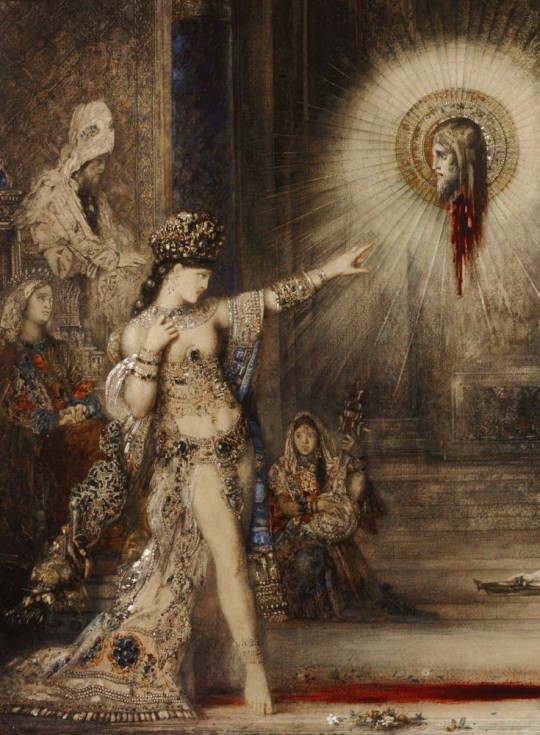




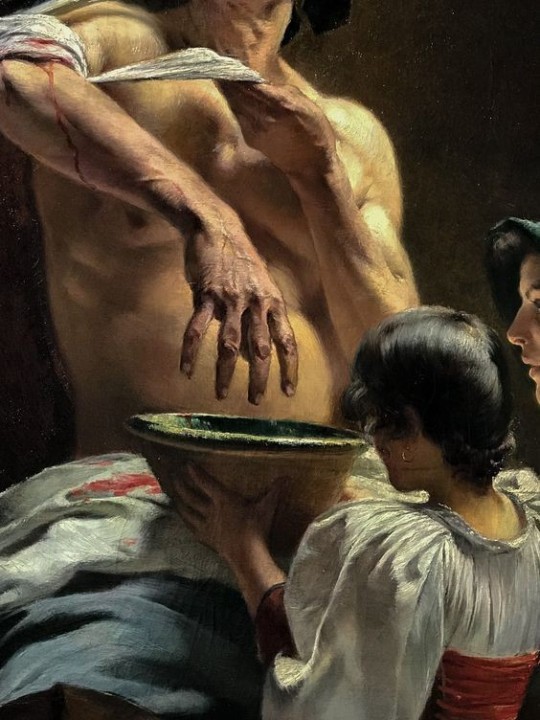
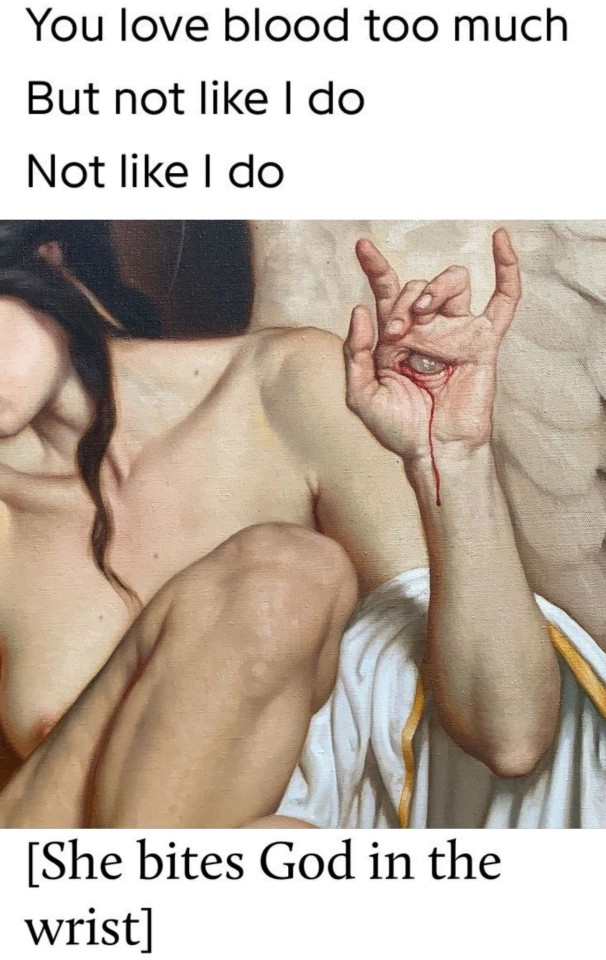
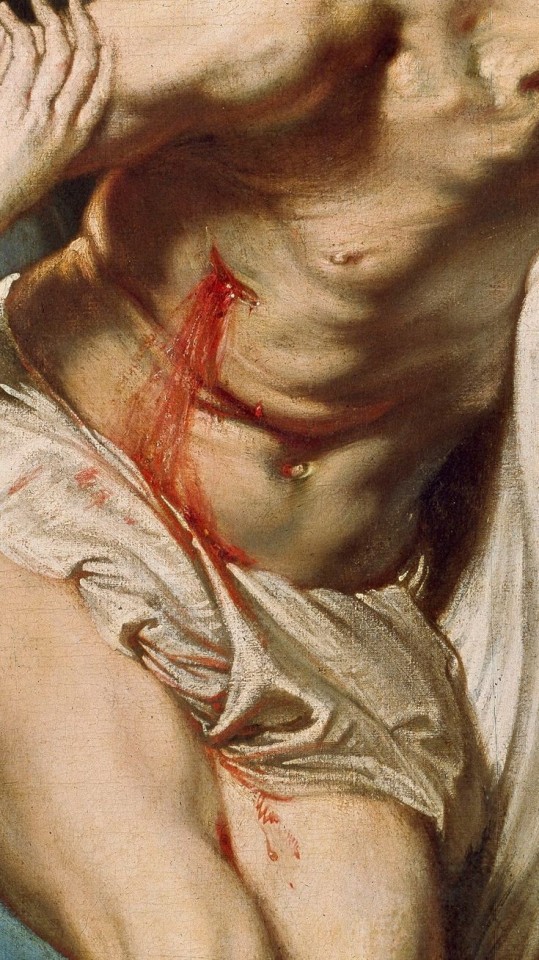
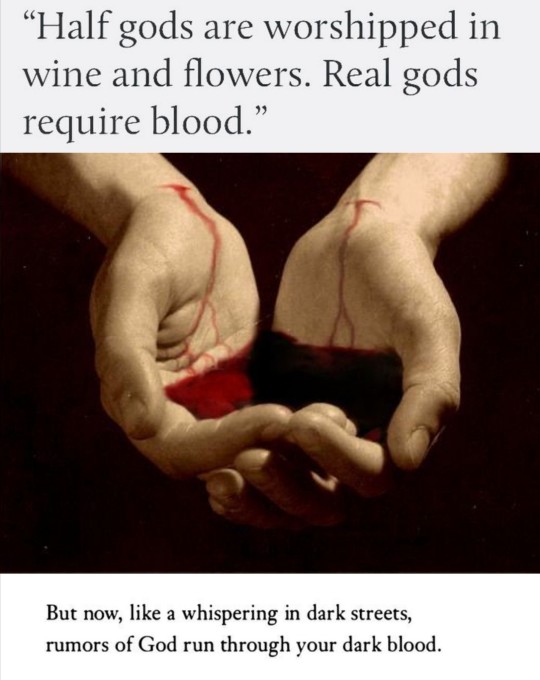
sources:
1. Archeology, Wisława Szymborska 2. Man of Sorrows 1460, Simon Marmion 3. Stratis Thalassinos Among the Agapanthi, George Seferis 4. The Apparition, Gustave Moreau 5. Family Tree (intro), Ethel Cain 6. Author/artist unknown 7. Christ Crowned With Thorns, Albrecht Bouts 8. Invictus, William Ernest Henley 9. What Colour Would God Bleed, Elisabeth Hewer 10. artist unknown 11. Ptolomaea, Ethel Cain 12. The Touch of the Angel, Roberto Ferri 13. Jet of Blood, Antonin Artaud 14. The Deposition 1615, Anthony van Dyck 15. Their Eyes Were Watching God, Zora Neale Hurston 16. Freedom, Skullrose 17. Book of Hours: Love Poems to God, Rainer Maria Rilke
#web weaving#blood#aesthetic#blood in religious depictions#religious aesthetic#ethel cain#ptolomaea#preachers daughter#God#godhood#gothic#gothic art#renaissance#renaissance art#literature#gothic literature#poetry#gothic poetry#dark academia#darkest academia#art#quote#religious imagery#family tree#angels#fallen angel#lucifer#horror#dark art#moodboard
28 notes
·
View notes
Note
hey justine! i see you reblogging beautiful quotes all the time and i was wondering if you could recommend me your favorite authors or books/poetry/anything?
this is so sweet <3
the list would be very VERY long if i was given an opportunity to put here every single writer and poet i love but for now i'll give you names of those who i've been reblogging (and obsessing over or came back to) a lot lately.
─ mary oliver (upstream: selected essays, devotions: the selected poems, a thousand mornings: poems)
─ virginia woolf (a room of one's own, to the lighthouse, the waves)
─ franz kafka (basically all of his short stories, e.g. the trial, the metamorphosis, his letters and diaries)
─ anne carson (as a translator the thing that mostly interests me in carson is her transaltion and adaptation of the oresteia - an oresteia but when it comes to poetry i'll point to plainwater: essays and poetry. i hope to read more from her and you can also find titles of her works on goodreads!)
─ anne sexton (selected or collected poems and i read that her letters are worth reading!)
─ clarice lispector (a breath of life and other, e. g. the hour of the star, the passion according to g. h., near to the wild heart, famaily ties)
─ susan sontag (journals and essays)
─ anaïs nin (her diaries)
─ albert camus (if you're interested in pondering upon human condition and existentialism, then everything this author has to offer! e. g. the stranger, the fall, the plague, the myth of sisyphus)
─ louise glück (collections of poems, e. g. poems 1962-2012, the triumph of achilles, averno)
─ george seferis (selected or collected poems)
─ rainer maria rilke (letters to a young poet, collected or selected poems, his letters)
#answered#anonymous#of course it wouldn't be me if i didn't recommend classic authors:#mary shelley; oscar wilde; william shakespeare; jane austen; sisters bronte; dostoevsky.#it's not all of them but i needed to write some of them down.#thank you for this message! talking about literature always makes my day <3
1 note
·
View note
Photo

Quotable – George Seferis
Find out more about the author here
32 notes
·
View notes
Note
What books are you reading lately? Love your work by the way!
(hello, and thank you)
here are the current tenants of book mountain (towering on my bed and nightstand):
- The Odyssey tr. Emily Wilson (so good)
- The Greek Plays (featuring translations by Wilson; I like her a lot)
- Achilles by Madeline Miller (just finished Circe, brilliant)
- Ovid’s Poetry of Exile
- Alphabet of Thorn by Patricia McKillip (favorite fantasy author second to Tolkien, of course)
- Songs and Stories of the Ghouls by Alice Notley
- Pride and Prejudice by Jane Austen (don’t judge me, it’s been a few years)
- Collected Poems by George Seferis
- Collected works of Vicente Huidobro
- The Book of Disquiet by Fernando Pessoa
- Priory of the Orange Tree by Samantha Shannon
18 notes
·
View notes
Photo
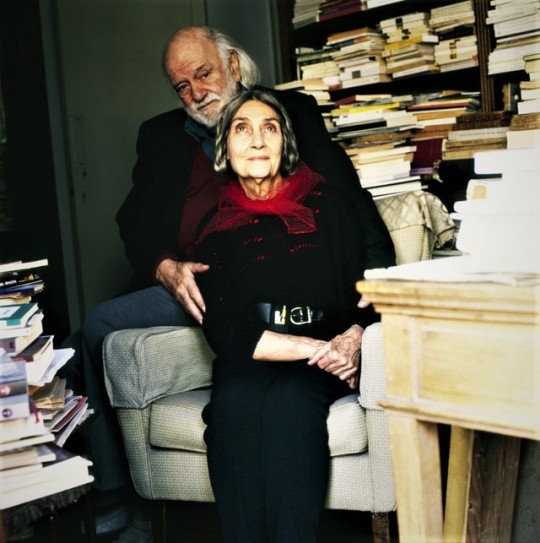
Ioannis (Nanos) Valaoritis (July 5, 1921 – September 13, 2019) was a Greek writer, widely published as a poet, novelist and playwright since 1939; his correspondence with George Seferis (Allilographia 1945-1968, Ypsilon, Athens 2004) was a bestseller. Raised within a cosmopolitan family with roots in the Greek War of Independence but twice driven into exile by events, Valaoritis lived in Greece, the United Kingdom, France and the United States, and as a writer and academic he played a significant role in introducing the literary idioms of each country to the rest. The quality, the international appeal, and the influence of his work led Valaoritis to be described as the most important poet of the Hellenic diaspora since Constantine Cavafy.
Valaoritis was born to Greek parents in Lausanne in Switzerland in 1921 but grew up in Greece where he studied classics and law at Athens University. He was also writing poetry, and in 1939 when he was barely eighteen, he saw himself published in the pages of George Katsimbalis’ review Nea Grammata alongside contributions from Odysseas Elytis and George Seferis, and was immediately taken into their literary circle. It was an ominous yet heady time, those early months of the war, during which Valaoritis was witness to the seminal encounter of Seferis and Katsimbalis with Henry Miller and Lawrence Durrell, which was to resonate within both Greek and Anglo-Saxon literature for years to come. Valaoritis met his wife Marie Wilson one evening at a large gathering in Paris full of Greek writers and artists. Marie Wilson was an American surrealist artist, Marie is the author of Apparitions: Paintings and Drawings by Marie Wilson. Wilson was embedded in the surrealist movement, and had a very close relationship with Andre Breton and Picasso. Nanos moved in together and lived there for six years, leading to marriage, which has now continued for forty years. They had three children together.
Daily inspiration. Discover more photos at http://justforbooks.tumblr.com
4 notes
·
View notes
Quote
The flowering sea and the mountains in the moon’s waning
the great stone close to the Barbary figs and the asphodels
the jar that refused to go dry at the end of day
and the closed bed by the cypress trees and your hair
golden; the stars of the Swan and that other star, Aldebaran.
I’ve kept a rein on my life, kept a rein on my life, travelling
among yellow trees in driving rain
on silent slopes loaded with beech leaves,
no fire on their peaks; it’s getting dark.
I’ve kept a rein on my life; on your left hand a line
a scar at your knee, perhaps they exist
on the sand of the past summer perhaps
they remain there where the north wind blew as I hear
an alien voice around the frozen lake.
The faces I see do not ask questions nor does the woman
bent as she walks giving her child the breast.
I climb the mountains; dark ravines; the snow-covered
plain, into the distance stretches the snow-covered plain, they ask nothing
neither time shut up in dumb chapels nor
hands outstretched to beg, nor the roads.
I’ve kept a rein on my life whispering in a boundless silence
I no longer know how to speak nor how to think; whispers
like the breathing of the cypress tree that night
like the human voice of the night sea on pebbles
like the memory of your voice saying ‘happiness’.
I close my eyes looking for the secret meeting-place of the waters
under the ice the sea’s smile, the closed wells
groping with my veins for those veins that escape me
there where the water-lilies end and that man
who walks blindly across the snows of silence.
I’ve kept a rein on my life, with him, looking for the water that touches you
heavy drops on green leaves, on your face
in the empty garden, drops in the motionless reservoir
striking a swan dead in its white wings
living trees and your eyes riveted.
This road has no end, has no relief, however hard you try
to recall your childhood years, those who left, those
lost in sleep, in the graves of the sea,
however much you ask bodies you’ve loved to stoop
under the harsh branches of the plane trees there
where a ray of the sun, naked, stood still
and a dog leapt and your heart shuddered,
the road has no relief; I’ve kept a rein on my life.
The snow
and the water frozen in the hoofmarks of the horses.
George Seferis, “Epiphany, 1937″ from Collected Poems (George Seferis). Translated, edited, and introduced by Edmund Keeley and Philip Sherrard. Copyright © 1995 by George Seferis. Reprinted by permission of Princeton University Press.
Source: George Seferis: Collected Poems(Princeton University Press, 1995)
George Seferis
BiographyMore poems by this author
Poem of the Day: Epiphany, 1937
Poem of the Day: Epiphany, 1937
Poem of The Day
{$excerpt:n}
Source: Poem of The Day
http://babakziai.org/poem-of-the-day-epiphany-1937/
1 note
·
View note
Photo
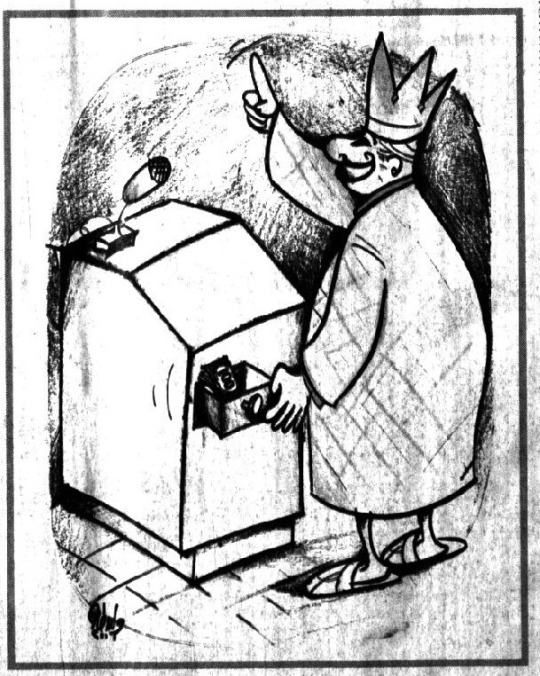
A Secret History of Arab Comics: The Case of the Egyptian Newspaper Al-Dostour During Mubarak's Twilight
Join me on Monday, March 5, for a presentation at Harvard’s Weatherhead Center for International Affairs as part of their Cultural Politics: Interdisciplinary Perspectives series. Details below.
(Top image by Walid Taher, Al-Dostour, 6 September 2006)

Cultural Politics: Interdisciplinary Perspectives
Date:
Monday, March 5, 2018, 4:30pm to 6:30pm
Location:
CGIS Knafel Building, 1737 Cambridge Street, Bowie-Vernon Room (K262)
"A Secret History of Arab Comics: The Case of the Egyptian Newspaper Al-Dostour During Mubarak's Twilight"
Speaker:
Jonathan Guyer, Fellow, Radcliffe Institute for Advanced Study, Harvard University. Independent Journalist.
Contact:
Ilana Freedman
[email protected]
Chairs:
Panagiotis Roilos, Faculty Associate. George Seferis Professor of Modern Greek Studies, Department of the Classics; Professor of Comparative Literature, Department of Comparative Literature, Harvard University.
Dimitrios Yatromanolakis, Associate Professor, Department of Classics, Department of Anthropology, and the Humanities Center, The Johns Hopkins University.
Abstract:
Cartooning has long been a pillar of the public discourse in Egypt. Especially during authoritarian times, cartooning has often been where political critique is loudest, or most daring. But the inherently ironic logic of cartooning means that the volume and barb of this critique is never straightforward. In fact, its very meaning derives from the fact that it tacks closely—and ambiguously—to red lines. In Egypt, a prohibition on “insulting” the president had long restricted the press and by extension cartoonists. But in the mid-2000s, a rag-tag group of cartoonists began to draw President Hosni Mubarak.
Based on archival research and interviews with cartoonists who worked together at the opposition weekly newspaper Al-Dostour, I will focus on illustrated attacks on political authority, notably Mubarak, in five years leading up to of the 2011 uprising. During this period, they would also launch revolutionary comics publications (and garner cult followings). Today these cartoonists, along with others in Cairo and Arab capitals, constitute an emergent Arab alternative comics (or alt-comix) movement. Influenced by little-known, radical Arab cartoonists from the past half-century, these cartoonists have persevered as trenchant critics amid successive, repressive regimes.
Biography:
Jonathan Guyer is a journalist focused on the politics of art and literature in the Middle East. He is a fellow at the Radcliffe Institute for Advanced Study at Harvard University and a contributing editor of the Cairo Review of Global Affairs. He has written for the Art Newspaper, Guernica, Harper’s, Los Angeles Review of Books, Modern Painters, Le Monde diplomatique, New Yorker, New York Review Daily, New York Times, Paris Review, and Rolling Stone, among others. His research has been supported by fellowships from Fulbright (2012–2013) and the Institute of Current World Affairs (2015–2017). He blogs at Oum Cartoon and tweets: @mideastXmidwest.
5 notes
·
View notes
Photo

Giorgos or George Seferis, the pen name of Georgios Seferiades, died September 20, 1971. He was one of the most important Greek poets of the 20th century, and a Nobel laureate, as well as a career diplomat in the Greek Foreign Service. 📚 #gsbauthorquotes #gsbquotesgiorgosseferis . . . . . . . . . . #gasstationburrito #onthisday #literaryhistory #bookstagram #books #bookworm #author #authorquotes #authormemes #writer #writerquotes #giorgosseferis #georgeseferis #georgiosseferiades #poet #poetry #greekpoet #findyourlanguage #writeyourhistory https://www.instagram.com/p/CFXdOwHBoAC/?igshid=447xww17c682
#gsbauthorquotes#gsbquotesgiorgosseferis#gasstationburrito#onthisday#literaryhistory#bookstagram#books#bookworm#author#authorquotes#authormemes#writer#writerquotes#giorgosseferis#georgeseferis#georgiosseferiades#poet#poetry#greekpoet#findyourlanguage#writeyourhistory
0 notes
Photo

Theatre in its western form was born in Greece.[324] The city-state of Classical Athens, which became a significant cultural, political, and military power during this period, was its centre, where it was institutionalised as part of a festival called the Dionysia, which honoured the god Dionysus. Tragedy (late 6th century BC), comedy (486 BC), and the satyr play were the three dramatic genres to emerge there. During the Byzantine period, the theatrical art was heavily declined. According to Marios Ploritis, the only form survived was the folk theatre (Mimos and Pantomimos), despite the hostility of the official state.[325] Later, during the Ottoman period, the main theatrical folk art was the Karagiozis. The renaissance which led to the modern Greek theatre, took place in the Venetian Crete. Significal dramatists include Vitsentzos Kornaros and Georgios Chortatzis. The modern Greek theatre was born after the Greek independence, in the early 19th century, and initially was influenced by the Heptanesean theatre and melodrama, such as the Italian opera. The Nobile Teatro di San Giacomo di Corfù was the first theatre and opera house of modern Greece and the place where the first Greek opera, Spyridon Xyndas’ The Parliamentary Candidate (based on an exclusively Greek libretto) was performed. During the late 19th and early 20th century, the Athenian theatre scene was dominated by revues, musical comedies, operettas and nocturnes and notable playwrights included Spyridon Samaras, Dionysios Lavrangas, Theophrastos Sakellaridis and others. The National Theatre of Greece was opened in 1900 as Royal Theatre.[326] Notable playwrights of the modern Greek theatre include Gregorios Xenopoulos, Nikos Kazantzakis, Pantelis Horn, Alekos Sakellarios and Iakovos Kambanelis, while notable actors include Cybele Andrianou, Marika Kotopouli, Aimilios Veakis, Orestis Makris, Katina Greek literature can be divided into three main categories: Ancient, Byzantine and modern Greek literature.[327] Athens is considered the birthplace of Western literature.[328] At the beginning of Greek literature stand the two monumental works of Homer: the Iliad and the Odyssey. Though dates of composition vary, these works were fixed around 800 BC or after. In the classical period many of the genres of western literature became more prominent. Lyrical poetry, odes, pastorals, elegies, epigrams; dramatic presentations of comedy and tragedy; historiography, rhetorical treatises, philosophical dialectics, and philosophical treatises all arose in this period. The two major lyrical poets were Sappho and Pindar. The Classical era also saw the dawn of drama. Of the hundreds of tragedies written and performed during the classical age, only a limited number of plays by three authors have survived: those of Aeschylus, Sophocles, and Euripides. The surviving plays by Aristophanes are also a treasure trove of comic presentation, while Herodotus and Thucydides are two of the most influential historians in this period. The greatest prose achievement of the 4th century was in philosophy with the works of the three great philosophers. Byzantine literature refers to literature of the Byzantine Empire written in Atticizing, Medieval and early Modern Greek, and it is the expression of the intellectual life of the Byzantine Greeks during the Christian Middle Ages. Although popular Byzantine literature and early Modern Greek literature both began in the 11th century, the two are indistinguishable.[329] Constantine P. Cavafy, whose work was inspired mainly by the Hellenistic past, while Odysseas Elytis (centre) and Giorgos Seferis (right) were representatives of the Generation of the ’30s and Nobel laureates in Literature. Modern Greek literature refers to literature written in common Modern Greek, emerging from late Byzantine times in the 11th century. The Cretan Renaissance poem Erotokritos is undoubtedly the masterpiece of this period of Greek literature. It is a verse romance written around 1600 by Vitsentzos Kornaros (1553–1613). Later, during the period of Greek enlightenment (Diafotismos), writers such as Adamantios Korais and Rigas Feraios prepared with their works the Greek Revolution (1821–1830). Leading figures of modern Greek literature include Dionysios Solomos, Andreas Kalvos, Angelos Sikelianos, Emmanuel Rhoides, Demetrius Vikelas, Kostis Palamas, Penelope Delta, Yannis Ritsos, Alexandros Papadiamantis, Nikos Kazantzakis, Andreas Embeirikos, Kostas Karyotakis, Gregorios Xenopoulos, Constantine P. Cavafy, Nikos Kavvadias, Kostas Varnalis and Kiki Dimoula. Two Greek authors have been awarded the Nobel Prize in Literature: George Seferis in 1963 and Odysseas Elytis in 1979., Manos Katrakis and Dimitris Horn. Significant directors include Dimitris Rontiris, Alexis Minotis and Karolos Koun. Greek literature can be divided into three main categories: Ancient, Byzantine and modern Greek literature.[327] Athens is considered the birthplace of Western literature.[328] At the beginning of Greek literature stand the two monumental works of Homer: the Iliad and the Odyssey. Though dates of composition vary, these works were fixed around 800 BC or after. In the classical period many of the genres of western literature became more prominent. Lyrical poetry, odes, pastorals, elegies, epigrams; dramatic presentations of comedy and tragedy; historiography, rhetorical treatises, philosophical dialectics, and philosophical treatises all arose in this period. The two major lyrical poets were Sappho and Pindar. The Classical era also saw the dawn of drama. Of the hundreds of tragedies written and performed during the classical age, only a limited number of plays by three authors have survived: those of Aeschylus, Sophocles, and Euripides. The surviving plays by Aristophanes are also a treasure trove of comic presentation, while Herodotus and Thucydides are two of the most influential historians in this period. The greatest prose achievement of the 4th century was in philosophy with the works of the three great philosophers. Byzantine literature refers to literature of the Byzantine Empire written in Atticizing, Medieval and early Modern Greek, and it is the expression of the intellectual life of the Byzantine Greeks during the Christian Middle Ages. Although popular Byzantine literature and early Modern Greek literature both began in the 11th century, the two are indistinguishable.[329] Constantine P. Cavafy, whose work was inspired mainly by the Hellenistic past, while Odysseas Elytis (centre) and Giorgos Seferis (right) were representatives of the Generation of the ’30s and Nobel laureates in Literature. Modern Greek literature refers to literature written in common Modern Greek, emerging from late Byzantine times in the 11th century. The Cretan Renaissance poem Erotokritos is undoubtedly the masterpiece of this period of Greek literature. It is a verse romance written around 1600 by Vitsentzos Kornaros (1553–1613). Later, during the period of Greek enlightenment (Diafotismos), writers such as Adamantios Korais and Rigas Feraios prepared with their works the Greek Revolution (1821–1830). Leading figures of modern Greek literature include Dionysios Solomos, Andreas Kalvos, Angelos Sikelianos, Emmanuel Rhoides, Demetrius Vikelas, Kostis Palamas, Penelope Delta, Yannis Ritsos, Alexandros Papadiamantis, Nikos Kazantzakis, Andreas Embeirikos, Kostas Karyotakis, Gregorios Xenopoulos, Constantine P. Cavafy, Nikos Kavvadias, Kostas Varnalis and Kiki Dimoula. Two Greek authors have been awarded the Nobel Prize in Literature: George Seferis in 1963 and Odysseas Elytis in 1979.#tourism#tour#worldtour #bestplace#nature#beauty enjoy#experience#history http://bit.ly/2JXqoKx
0 notes
Link
In grasping the meaning of printed page, another approach that works is the effective use of the reader's imagination.
But what is imagination?
Stripped of all technicalities, imagination is the ability to clearly visualize causes and effects relations surrounding an event or incident through the use of the reader's inner eyes.
It derives its importance from the fact that there're always gaps in imaginative works.
Or put differently, there're always gaps in nature for which answers must be provided for fuller understanding.
What then is Gap(s) especially as its concerns creative writings?
Gap, first and foremost is a link that's conspicuously absent in the construction of mental realities whether in description, narration, exposition and argumentation which are the four pillars in idea generation and development.
Gaps exist, therefore, in imaginative works as a result of one or a combination of what the author said with
fewer or insufficient words and what he left unsaid.
What he or she said with fewer words that set in motion our imagination.
Or what he or she left unsaid that must be covered by the lively use of the reader's imagination.
In any case, all creative people use imagination- it is in fact the essence of their work to do so.
Or else they will not be effective.
Novelists, Poets, Dramatists, Engineers, Doctors one way or the other deploy their imaginative abilities to solve new or lingering problems.
For instance, medical personnel reason either from cause to effect or from effect to cause in proffering solutions to many health challenges.
Put more succinctly, they reason from known causes of ailments to the hope for effects which is the cure.
And imagination plays an important role in this without necessarily downplaying experience, expertise and what not.
But the imaginative writer, on the other hand, is nobly taking the readers through a journey of 'understanding the unseen' through the use of words in ways many may not be familiar with.
And they've got the licence to do so.
This more than not leads to gaps in their write ups which the readers must fill up with the use of their imagination.
So, imagination is not like some may take it to mean an idle act of daydreaming that brings no positive impact with it.
It is ability to create and recreate realities and amplify them; and to create new pictures of things in the minds of the readers as well as the hearers.
How does it work?
I think it’s pretty simple and I'm not indulging in oversimplification which is a known barrier in straight thinking.
It involves the reader as a re creative speaker or a go-between being able to connect with the author by feeling what he has felt, seeing what he has seen and hearing sounds which he has heard.
In no other imaginative work, to my mind, is the reader's imagination gets more excited or calls to duty than in this great poem by the Greek poet and Nobel Prize winner, George Seferis, titled
'Mythistorema', Part IV, from 'Argonauts' as translated by Rex Warner.
This is particularly vivid right from the two magical opening sentences of the poem in which to a narrow extent the poet addresses the Greeks and to a generalized senses all of humanity.
You're bound to encounter several instances in the poem in which the poet trigger our imagination to see things not just literally.
The full text below:
They were good lads, the comrades. They did not grumble
Because of weariness or because of thirst or because of frost,
They had the manner of trees and manner of waves
That accept the wind and the rain,
Accept the night and the sun,
And in the midst of change they do not change,
They were good lads, Day after day with downcast eyes
They used to sweat at the oar,
Breathing rhythmically,
And their blood flushed up to an obedient skin.
There was a time when they sang, with downcast eyes,
When we passed the desert island with Arabian figs,
Towards the setting of the sun, beyond the cape
Of dogs that howl.
If it is to know itself, they used to say,
It is into a soul it must look, they used to say.
And the oars beat on the gold of the sea
In the middle of sunset.
Many the capes we passed, many the islands, the sea
Which brings the other sea, sea-gulls and seals.
There were times when unfortunate women with lamentations
Cried for their children gone,
And others with wild faces looks for Great-Alexander
And glories sunken in the depth of Asia.
We anchored by shores steeped in nocturnal perfumes
Among the singing of birds, waters that left on the hands
The recollection of a great good fortune.
But there was never an end to the journeys.
Their souls became one with the oars and the rowlocks,
With the sever figurehead at the prow,
With the water that fractured the image of their faces.
One after another the comrades died
With downcast eyes. Their oars
Indicates the places where they sleep on the shore.
There is none to remember them, and the word is Justice.
'Mythistorema', Part IV, from 'Argonauts'
by George Seferis
translated by Rex Warner.
0 notes